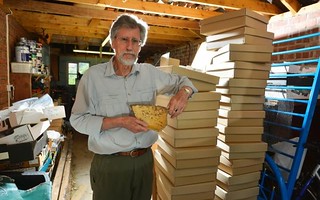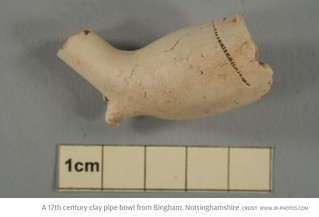
PREV ARTICLE
NEXT ARTICLE
FULL ISSUE
PREV FULL ISSUE
BRITISH ARCHAEOLOGISTS ARE RUNNING OUT OF STORAGE
This article from The Telegraph, found via The Explorator newsletter, notes that British archaeologists are running out of
space to store their finds. -Editor
Thousands of objects which could shed light on the lives of our ancestors - such as Roman pottery fragments, Stone Age flints, medieval coins and animal bones – are being abandoned or lost because there is nowhere to store them properly. Archaeology groups have now warned the country is in danger of “forgetting its own past”. The problem is having a particular impact on community archaeology groups who have been told that cuts in funding mean local museums can no longer afford to store and curate their finds. That has forced them to return the objects to the owners of the land from where they were first excavated, running the risk they will be lost forever when people move home or simply become fed up with storing the material.
Objects from digs are frequently lost simply because it was not stored properly and nobody can remember where it was kept. Professor Carenza Lewis, of the University of Lincoln, said: “Material is being lost all the time. In many cases it has been thrown away because the people who gathered and collated the objects have moved on or died and their children or executors come across what they might regard as a load of junk and throw it out. “The problem is getting worse because country councils have lost funding and museums have shut down or don’t have the staff to curate and look after archaeological finds.” In Nottinghamshire the Bingham Heritage Trail Association (BHTA), which has excavated some 14,000 historic objects and fragments in the past two years as part of the market town’s community dig project, has been forced to return them to the owners of the properties in whose grounds they were found. The pieces - a mixture of Roman and Anglo-Saxon pottery and tile fragments, Mesolithic and Neolithic flint work and 16th century wine bottles and animal bones - have been catalogued and placed in museum boxes before being returned.
I've not heard of this being a problem with dug coins (although this article does mention medieval coins among the surplus). First,
they're small and take less space, but there is also a vibrant marketplace of collectors. Is that not the case with other artifacts?
Of course the best scenario for museums and scholars is to keep the material on hand, but auction houses and dealers can do a passable
job of cataloging and documenting material, and collectors generally preserve the provenance of items in their collections. So why not
sell more of the surplus material? Proceeds could help pay for new storage space, reducing the problem in the future. If a large enough
market doesn't currently exist, perhaps the appearance of more material for sale will help boost that market. -Editor
To read the complete article, see:

Wayne Homren, Editor The Numismatic Bibliomania Society is a non-profit organization promoting numismatic literature. See our web site at coinbooks.org. To submit items for publication in The E-Sylum, write to the Editor at this address: whomren@gmail.com To subscribe go to: https://my.binhost.com/lists/listinfo/esylum All Rights Reserved. NBS Home Page Contact the NBS webmaster 
|

